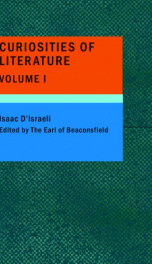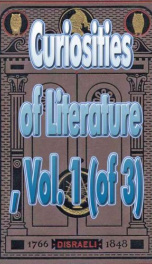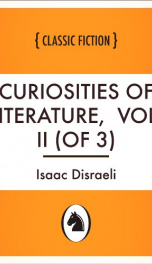Disraeli Isaac

Isaac D'Israeli (11 May, 1766 – 19 January, 1848) was a British writer, scholar and man of letters. He is best known for his essays, his associations with other men of letters, and for being the father of British Prime Minister Benjamin Disraeli. Isaac was born in Enfield, Middlesex, England, the only child of Benjamin D'Israeli (1730-1816), a Jewish merchant who had emigrated from Cento in Italy in 1748, and his second wife, Sarah Syprut de Gabay Villa Real (1742/3–1825). He received much of his education in Leiden. At the age of sixteen he began his literary career with some verses addressed to Samuel Johnson. He became a frequent guest at the table of the publisher John Murray and became one the noted bibliophiles of the time. On February 10, 1802, D'Israeli married Maria Basevi (1774/5–1847), who came from another London family of Italian-Jewish extraction. The marriage was a happy one, producing five children: Sarah ("Sa"; 1802–1859); Benjamin ("Ben" or "Dizzy"; 1804–1881); Naphtali (b. 1807, died in infancy); Raphael ("Ralph"; 1809–1898); and Jacobus ("James" or "Jem"; 1813–1868). The children were named according to Jewish customs and the boys were all circumcised. However, on the advice of his friend the historian Sharon Turner, and in the midst of an eight-year dispute with the Bevis Marks Synagogue, all his children were baptized into the Church of England in 1817. He penned a handful of English adaptations of traditional tales from the Middle East, wrote a few historical biographies, and published a number of poems. His most popular work was a collection of essays entitled Curiosities of Literature. The work contained a myriad of anecdotes about historical persons and events, unusual books, and the habits of book-collectors. The work was very popular and sold widely in the 19th century, going through many editions . It is still in print. His book The Life and Reign of Charles I (1828) resulted in his being awarded the degree of D.C.L. from Oxford University. In 1841 he became blind and, though he underwent an operation, his sight was not restored. He continued writing with his daughter as his amanuensis. In this way he produced Amenities of Literature (1841) and completed the revision of his work on Charles I. He died of influenza at age 81, at his home, Bradenham House, in Buckinghamshire, less than a year after the death of his wife in the spring of 1847.
do you like this author?
What readers are saying
What do you think? Write your own comment on this book!
write a commentWhat readers are saying
What do you think? Write your own comment on this author!
write a commentBook list

Amenities of LiteratureConsisting of Sketches and Characters of English Literature
Series:
Unknown
Year:
Unknown
Raiting:
4/5
Show more
add to favoritesadd In favorites
Book list

Amenities of LiteratureConsisting of Sketches and Characters of English Literature
Series:
Unknown
Year:
Unknown
Raiting:
4/5
Show more
add to favoritesadd In favorites

Literary Character of Men of GeniusDrawn from Their Own Feelings and Confessions
Series:
Unknown
Year:
Unknown
Raiting:
2.5/5
Show more
add to favoritesadd In favorites

the literary character microform illustrated by the history of men of genius
Series:
Unknown
Year:
Unknown
Raiting:
3/5
Show more
add to favoritesadd In favorites

the literary character or the history of men of genius drawn from their own
Series:
Unknown
Year:
Unknown
Raiting:
3/5
Show more
add to favoritesadd In favorites

the genius of judaism
Series:
Unknown
Year:
Unknown
Raiting:
3.5/5
Purchase of this book includes free trial access to www.million-books.com where you can read more than a million books for free. This is an OCR edition with typos. Excerpt from book: 16 CHAPTER III. THE LAWS OF THE JEWISH PEOPLE CONSTITUTE THEIR RELIGION. The first miracle of Judaism was the divine institution of the religion. To promulgate the sublime dogma of the unity of Jehovah, the Creator embracing all nature, the first government of the Israelites was Theocracy. " The earth shook and the heavens also dropped in the presence of God ." The devouring fires of Sinai proclaimed the deliverance of the law of Moses. The apparition of the Deityan apparition without similituderested before the eye of mortal man. Three millions of human witnesses attested and trembled. From amidst the dense cloudhanging on the mountain, " the voice of the words" sanctified and established Judaism for eternity. Psalm Ixviii. 8. The awful vision is first described in Exodus, xix. 16, and further in Deut. iv. 10. Another still more beatific, was subsequently granted to the elders of Israel, when invited by Moses to ascend with him,before this servant of the Eternal passed into the midst of the cloud. It has all the indistinctness of whatever is superhuman, when the mortal becomes a spectator of an object of which he is unacquainted with a prototype. The Deity appeared, as if his feet were resting on a paved way, inlaid with stars, amidst the azure of the sapphire, the aerial substance of the Heavens, lucid and serene. Aboab, Parafrasis Comentadas, p. 259. Cardoso, a zealous Hebrew, calculates the number. The six hundred thousand mentioned in Scripture, consisted only of the warriors of Israel, between the age of twenty to sixty. The aged, the children, the women, the domestics, would authorise the number of the millions, and less than millions would not satisfy the eager imaginations of the Jews as the witnesses of the authentic mission. It is curious to ad...
Show more
add to favoritesadd In favorites

curiosities of literature in three volumes volume 3
Series:
Unknown
Year:
Unknown
Raiting:
4.5/5
Show more
add to favoritesadd In favorites

curiosities of literature volume 1
Series:
Unknown
Year:
Unknown
Raiting:
4.5/5
Edited by The Earl Of Beaconsfield
Show more
add to favoritesadd In favorites

an essay on the manners and genius of the literary character
Series:
Unknown
Year:
Unknown
Raiting:
4/5
Show more
add to favoritesadd In favorites

amenities of literature consisting of sketches and characters of english liter
Series:
Unknown
Year:
Unknown
Raiting:
3/5
Show more
add to favoritesadd In favorites

Curiosities of Literature, Vol. 1 (of 3)
Series:
Unknown
Year:
Unknown
Raiting:
4/5
From Content: "This is the first collected edition of a series of works which have separately attained to a great popularity: volumes that have been always delightful to the young and ardent inquirer after knowledge. They offer as a whole a diversified miscellany of literary, artistic, and political history, of critical disquisition and biographic anecdote, such as it is believed cannot be elsewhere found gathered together in a form so agreeable and so attainable. To this edition is appended a Life of the Author by his son, also original notes, which serve to illustrate or to correct the text, where more recent discoveries have brought to light facts unknown when these volumes were originally published. The traditionary notion that the life of a man of letters is necessarily deficient in incident, appears to have originated in a misconception of the essential nature of human action. The life of every man is full of incidents, but the incidents are insignificant, because they do not affect his species; and in general the importance of every occurrence is to be measured by the degree with which it is recognised by mankind. An author may influence the fortunes of the world to as great an extent as a statesman or a warrior; and the deeds and performances by which this influence is created and exercised, may rank in their interest and importance with the decisions of great Congresses, or the skilful valour of a memorable field. M. de Voltaire was certainly a greater Frenchman than Cardinal Fleury, the Prime Minister of France in his time. His actions were more important; and it is certainly not too much to maintain that the exploits of Homer, Aristotle, Dante, or my Lord Bacon, were as considerable events as anything that occurred at Actium, Lepanto, or Blenheim. A Book may be as great a thing as a battle, and there are systems of philosophy that have produced as great revolutions as any that have disturbed even the social and political existence of our centuries.[Pg viii] The life of the author, whose character and career we are venturing to review, extended far beyond the allotted term of man: and, perhaps, no existence of equal duration ever exhibited an uniformity more sustained. The strong bent of his infancy was pursued through youth, matured in manhood, and maintained without decay to an advanced old age. In the biographic spell, no ingredient is more magical than predisposition. How pure, and native, and indigenous it was in the character of this writer, can only be properly appreciated by an acquaintance with the circumstances amid which he was born, and by being able to estimate how far they could have directed or developed his earliest inclinations. My grandfather, who became an English Denizen in 1748, was an Italian descendant from one of those Hebrew families whom the Inquisition forced to emigrate from the Spanish Peninsula at the end of the fifteenth century, and who found a refuge in the more tolerant territories of the Venetian Republic. His ancestors had dropped their Gothic surname on their settlement in the Terra Firma, and grateful to the God of Jacob who had sustained them through unprecedented trials and guarded them through unheard-of perils, they assumed the name of DISRAELI, a name never borne before or since by any other family, in order that their race might be for ever recognised. "
Show more
add to favoritesadd In favorites
What readers are saying
What do you think? Write your own comment on this author!
write a commentif you like Disraeli Isaac try:
readers also enjoyed
What readers are saying
What do you think? Write your own comment on this author!
write a commentGenre
if you like Disraeli Isaac try:
readers also enjoyed
Do you want to read a book that interests you? It’s EASY!
Create an account and send a request for reading to other users on the Webpage of the book!


